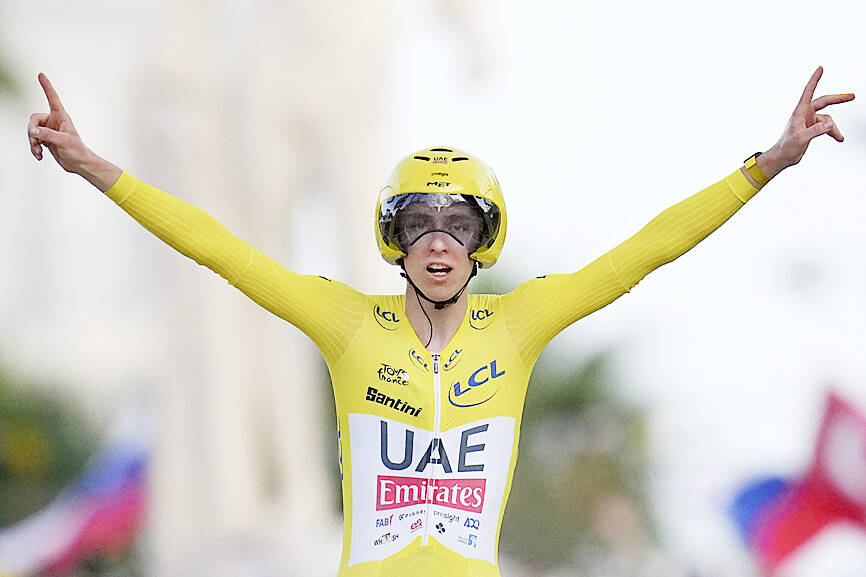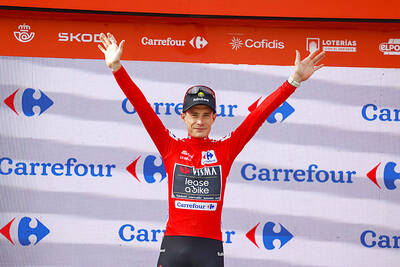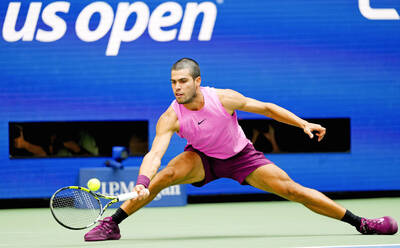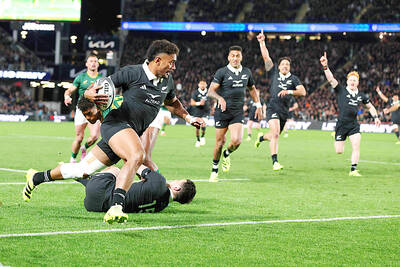Not so long ago, cyclists heading to the Tour de France were skinny string beans weighing and measuring every grain of rice that entered their body, but that image has not just gone, it has taken a seismic shift in the other direction. This year’s riders will be gorging themselves like never before, taking on board the equivalent of a large plate of pasta per hour and even training their stomachs to cope with the influx of food.
“Intake has doubled,” said Julien Louis, nutritionist for the Decathlon–AG2R La Mondiale team.
In fact, it is a 180-degree turnaround from the 2010s and the “low carb” fad popularized by four-time Tour de France winner Chris Froome’s Team Sky. That method consisted of depriving the body of sugars during training in order to lose weight and encourage the body to use fat for energy.

Photo: AP
“Two eggs for breakfast and we were off for five, six hours of training, with water in the bottles. We were exhausted the whole time,” recalled British veteran Simon Yates, winner of the last Giro d’Italia.
Climber Pavel Sivakov paints an even more dramatic picture.
“Mentally, it was very hard,” he said. “We were starving, with no energy, tapping into our fat.”
Those days are gone.
“When there’s nothing left in the tank the runner switches to using fat,” explained Louis, who used to work for English Premier League soccer team Liverpool. “It works, but it’s much less effective than carbohydrates.”
One look at the map for the Tour de France which runs 3,338km over three weeks from Lille, all the way down south and back up to Paris for the finish, is a giveaway when it comes to a rider’s nutritional needs. He will burn through about 7,000 calories on one of the lung-busting, muscle-crunching mountain stages.
“You have to eat four times as much as a normal person,” Cofidis rider Simon Carr said. “We’ve never eaten so much on a bike.”
Most riders now take in up to 120g of carbohydrates per hour while racing, in some cases even more, which is enormous.
“It’s the equivalent of six bananas or around 200 grammes of dried pasta per hour,” Louis said.
Until recently, eating such large quantities, mainly in the form of gels and energy drinks, was unimaginable, as it would lead to too much intestinal distress.
“Up until five years ago, 120g of carbohydrates per hour was impossible,” Tadej Pogacar explained in a podcast in September last year, adding that such an intake would have had him in dire need of a trip to the toilet.
Since then, great progress has been made with energy products, which now contain a combination of two types of carbohydrate.
“For a long time, we thought there was only one kind of carbohydrate transporter in the intestine,” Louis said. “Then we discovered that there was a second type that could transport fructose. As a result, by using these two pathways at the same time, we can push through twice as much sugar.”
According to all the parties interviewed, these advances in nutrition, along with developments in equipment and training methods, help to explain the increasingly high levels of performance in cycling, a sport which has often been associated with doping. Although products are now better tolerated by the body, making this revolution possible, riders still have to train their stomachs to cope with such quantities.
“Otherwise you can’t digest when you’re asked to eat six gels an hour. Your body just can’t cope,” said Pauline Ferrand-Prevot, this year’s winner of the women’s Paris-Roubaix and gold medalist in the cross-country mountain bike at the Paris Olympics.
She found this out the hard way when she gave up, ill, during the world championships in September last year, unused to the longer distances after her switch from mountain bikes.
During winter training, the riders now do “at least one session a week of intestinal training, or ‘gut training,’” Louis said. “At the very beginning, there may be a little discomfort, but without it, you’re at a huge disadvantage. It’s as if you’re not running on the same fuel.”

Jonas Vingegaard on Tuesday claimed the overall Vuelta a Espana lead while Jay Vine earned the stage 10 victory for his second triumph of the race. Two-time Tour de France winner Vingegaard overhauled Torstein Traen’s lead to head the general classification by 26 seconds from the Norwegian, with Joao Almeida third and trailing the Dane by 38 seconds. Vine put in an unmatchable performance on the final climb to finish ahead of Spanish Movistar riders Pablo Castrillo and Javier Romo. “Back in red, I’m happy with it, it’s a beautiful jersey,” Vingegaard said. “I’m happy with how the day went,

The Kansas City Chiefs wrapped up a brief visit to Brazil on Friday with a season-opening loss to the Los Angeles Chargers, but despite the defeat, the team outshone their divisional rivals in the fight for the hearts and minds of Brazilian fans. In Sao Paulo for just the second-ever NFL game in the city, Chiefs players — especially quarterback Patrick Mahomes and tight end Travis Kelce — were treated as major celebrities throughout their stay, turning Corinthians Arena into a scene reminiscent of the Chiefs’ Arrowhead Stadium. Before kickoff, crowds of fans gathered around the Chiefs’ tunnel, eager to catch a

RIVALRY: Carlos Alcaraz lost his previous two matches against Serbia’s Novak Djokovic, in the Australian Open quarter-finals this year and Paris Olympics final last year Spain’s Carlos Alcaraz on Tuesday dazzled at the US Open to make the semi-finals before Novak Djokovic of Serbia danced his way through to book a New York showdown with the Spaniard that would mark the latest chapter in their generational rivalry. Former champion Alcaraz produced yet another entertaining display at Flushing Meadows to dismantle 20th seed Jiri Lehecka 6-4, 6-2, 6-4 at a sunbathed Arthur Ashe Stadium, securing his place in the last four without dropping a set this year. “Sometimes I play a shot that I should not play in that moment, but it’s the way I love

New Zealand stayed firm at their Eden Park fortress to claim an attritional 24-17 win over South Africa in a heavyweight clash between the world’s top two rugby sides yesterday. Under pressure after conceding a first-ever defeat on Argentine soil against the Pumas two weeks ago, the All Blacks responded with a performance of grit and discipline to stretch their unbeaten run at their Auckland stronghold to 51 matches. Two well-taken tries by Emoni Narawa and Will Jordan set up a 14-3 lead at halftime before Quinn Tupaea grabbed a third five-pointer for the hosts 13 minutes from time. Well-held for most of